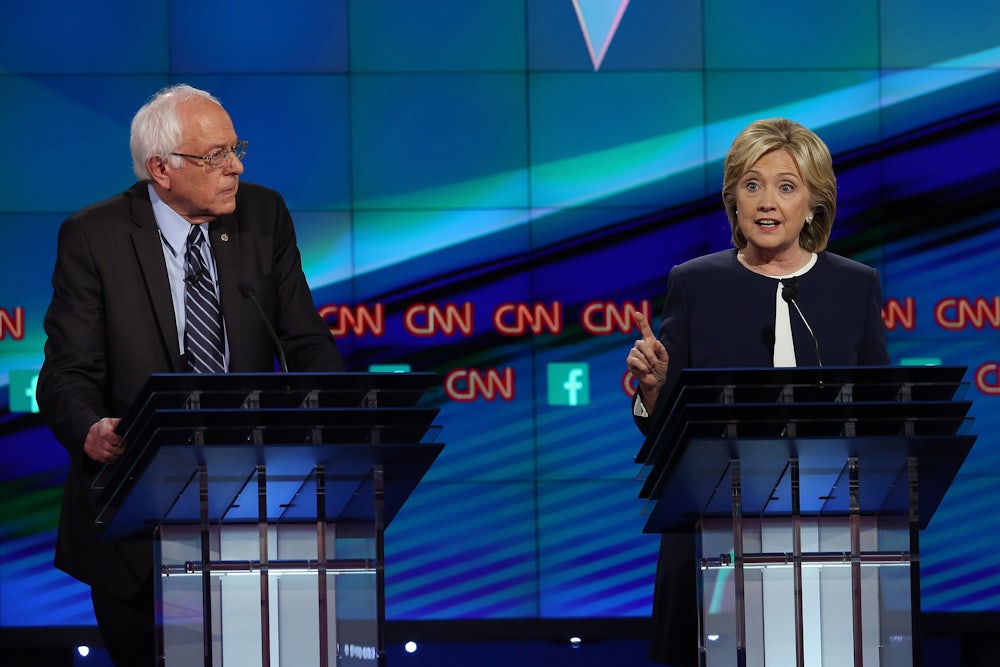This week the American Postal Workers Union (APWU) announced its endorsement of Vermont Senator Bernie Sanders in the 2016 Democratic primary, with APWU President Mark Dimondstein explaining that Sanders “stands above all others as a true champion of postal workers and other workers throughout the country.” Dimondstein cited Sanders’s support of the consolidation of mail-processing facilities and his attention to the U.S. Postal Service’s financial crisis as examples of the senator’s commitment to issues affecting postal workers. “We should judge candidates not by their political party, not by what they say, not by what we think they stand for, but by what they do,” Dimondstein added, in what was perhaps a veiled remark upon the role of organized labor so far in the presidential race.
So far, former Secretary of State Hillary Clinton has performed well among labor, earning endorsements from major unions like the American Federation of State, County, and Municipal Employees (AFSCME), the dockworkers’ International Longshoremen’s Association (ILA), and the National Educators Association (NEA), a teachers union with three million members. Sanders, meanwhile, is trying to catch up to Clinton, picking up endorsements from the APWU, the National Union of Healthcare Workers (NUHW), and National Nurses United (NNU). In general, the unions swinging for Sanders are somewhat smaller than those backing Clinton.
The paucity of union endorsements for Sanders hasn’t sat well with Clinton skeptics. As Josh Eidelson points out at Bloomberg, “Skepticism of Clinton is fueled in part by frustration with her positions on issues important to many union members, including the $15 federal minimum wage.” A flyer produced by the group Labor for Bernie cites the senator’s position on raising the minimum wage in conjunction with his interest in reducing income inequality and eradicating big money from politics as further reasons to support the Sanders campaign.
Indeed, unions have been avid in supporting Sanders materially. Over the course of his political career, Sanders has received hundreds of thousands of dollars in donations from unions, including the Machinists, United Auto Workers, Teamsters, and more. During his presidential campaign, many of his top donors have been unions as well. So why are the very unions that give Sanders money hesitant to lend him their endorsements?
It all comes down to union efforts to secure their status politically, according to Dissent contributing editor and frequent labor writer Richard Yeselson. “These days, if a Democratic incumbent (on either the local or national level) says most of the right things about labor, the union will endorse that candidate even if there is an ostensibly more leftwing candidate in opposition,” Yeselson explained in an email, “that’s because unions, weaker than ever, are terrified of losing their clout with the likely winner.” Yeselson pointed out that betting safe is something of a tradition for unions even when their circumstances are not particularly compromised, noting that “even at their most powerful in the immediate postwar period, many labor leaders—having been unable to stop passage of the anti-union Taft-Hartley Act, decisively win major strikes, or reach an accord with business—worried that unions needed the government buttressing in order to maintain their power. Unions thus mostly endorsed incumbent Harry Truman, rather than the leftist third party effort of Henry Wallace.” Some observers were critical of the decision, but Yeselson noted it “wasn’t much different than the ones made today: don’t pick a candidate or a party you don’t think is going to win.”
This does not mean all unions are unwilling to risk a bet on a candidate with uncertain prospects. National Nurses United has long been a highly politically active union, lobbying for a Robin Hood Tax, which is a proposed financial transaction tax on Wall Street that would be used to fund various universal social programs. Among its reasons for supporting Sanders, the NNU lists a series of issues not entirely limited to the nursing profession, including opposition to the Trans-Pacific Partnership (TPP) and the Keystone XL pipeline, and support for tighter regulations on Wall Street and increased climate protection. For unions with political goals that transcend the direct professional concerns of their members, candidates like Sanders, with unique political platforms, might be worth the gamble.
Nonetheless, upsets do occur. The International Association of Fire Fighters, for example, came close to endorsing Clinton, but balked at the last moment over disagreements between leadership and rank-and-file members. Political tides, too, can shift endorsement plans. In 2008, Las Vegas’s Culinary Union finally endorsed Barack Obama after his bitter campaign fight with Clinton, during which it was unclear how the union would decide. Some of the union’s staff recall the the endorsement controversy as akin to a “civil war battle,” a testament to the stress on unions to bet smart, as well as to the pressure on candidates to present themselves as the best bet.
Which is ultimately the grand irony of the race for union endorsements. The more endorsements a candidate can accrue, the likelier his or her victory appears, which can encourage other unions hoping to build a rapport with the candidate most likely to succeed. Increasingly compromised by political campaigns against organized labor, unions are smart to try to secure relationships with the leaders who will ultimately decide their fate—but until the unions themselves have stable footing, they will remain at a disadvantage when it comes to choosing the candidates they would prefer, all things being equal. This tension between shrewd political maneuvering and popular support likely explains why so many members of unions officially endorsing Clinton show up on Sanders’s labor supporters list.
As the primary season progresses, several more surprising endorsements could emerge—but the best outcome for unions may well be the election of a candidate who would lower the stakes on the betting game altogether.
